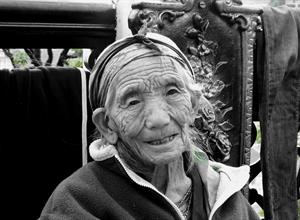PDF chapter test TRY NOW

The farmer's mother's eyesight was not dim but keen, despite her advanced age. Despite her inability to see clearly, she was able to notice her son's rush to reach the mountain summit without realising or understanding the consequences. Since the farmer was young, he was solely focused on achieving his goal, unaware of the consequences of how he would return home in the evening or at night.
The farmer's mother, on the other hand, thought about it since her age and experience had led her to think so. She was well aware that her son was unfamiliar with the mountain's numerous pathways and that his return journey could be dangerous. As a result, she thought about a number of ways to ensure her son's safe return home. She then had an idea; she snapped the twigs from the trees along the route and gently dropped a handful of them every few feet as they climbed the mountain. As she planned, the twigs she dropped on the exact pathways formed a dotted line with tiny stacks of twigs at regular intervals. So, she knew that would help her son not miss the way and return safely.
The farmer's mother's plan reveals three things:
a. People who are older are smarter, even if they are not physically more active.
b. The more the farmer's mother was older and experienced, the more problems she will be able to solve.
c. Older individuals don't react or work as rapidly as younger people do, but they do so more intelligently and with greater accuracy, and they make judgments based on the implications.
When the farmer bid his farewell to his mother, she gave him one last piece of advice for her son in a trembling voice. Her selfless affection had reflected in her helpful suggestions. After all, mothers are all the same, and they consider their children's well-being in the face of any difficulty. Despite being on her deathbed, the farmer's mother, like any other mother, was concerned about her son's safety. The elderly mother warned her son about walking around in the mountains since it would be dangerous.
She told him so because she was concerned that her son would lose his way and become stuck in one of the places, fall into one of the mountain pits, or be captured by any wild creatures. For this reason, his mother advised him to be cautious on his way home and to follow the twigs she had dropped on the way to the summit. She told him that the twigs would be quite useful in guiding him back to the familiar road.
When the farmer looked back at the path after listening to his mother, he was surprised to see the twigs. He next noticed his mother's hands, which were scratched and stained from the twigs she had gathered and handled.
His mother's affection affected him deeply. "Oh, honourable mother, your kindness breaks my heart!" he screamed out loudly. "I will not leave you. Together we will follow the path of twigs, and together we will die!". The poor farmer's screams and sobs expressed his love for his mother. He didn't want to abandon his mother, despite the fact that he knew it would mean his mother's death.
